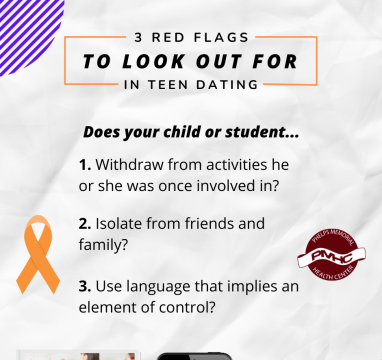February is teen dating violence awareness month.
There are some red flags that parents and teachers should look out for in teens in relationships. They include withdrawing from activities in which they were once invested, isolation from family and friends, and using language that implies an element of control such as, “I need to ask my boyfriend or girlfriend about that first.”
People who are abused in their teen and young adult years are more at risk of being victimized in the future. Also, domestic violence relationships that start in the teen years tend to intensify into more severe physically violent relationships.
It’s important that kids know what a healthy relationship is, so they have something to compare to.
Encourage open, honest and thoughtful reflection.
Be sensitive and firm. Parenting a young teen is not easy – especially when it comes to helping him or her navigate their way through relationships. There is a quote from an anonymous source that says “Adolescence is a period of rapid changes. Between the ages of 12 and 17, for example, a parent ages as much as 20 years.”
Let’s face it, a lot of what we say to our teenagers, goes in one ear and out the other – or at least we think it does. Keep talking anyway! Be willing to talk openly and respect difference of opinion. And realize the decisions you make will sometimes be unpopular with your young teen.
Understand the pressure and the risk teen’s face. Preteens and young teens face new and increasing pressures about sex, substance abuse and dating. Be the person that teens can go to when they need to talk, and help them through situations they face!
Take a clear stand. Make sure young teens know how you feel about disrespect, use of abusive or inappropriate language, controlling behavior, or any forms of violence. Use tv, movies, music lyrics, news, community events or the experiences of friends to discuss healthy and unhealthy relationships.
Teach kids how to stand up for friends when he or she observes unhealthy treatment of his or her peers.
And finally, it’s important to know that you will make mistakes. Accept them, but continue to help teems make responsible choices while trying to maintain that delicate balance of being sensitive, but firm.
If you or someone you know is in an abusive dating relationship, free and confidential help is available 24 hours a day, 7 days a week through the National Teen Dating Abuse Helpline. The number is 866-331-9474.



